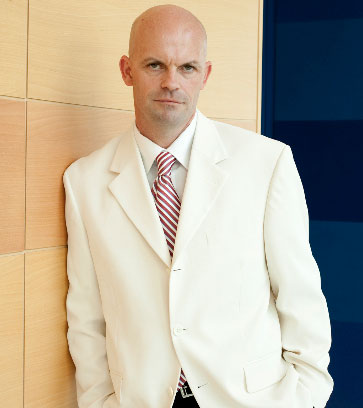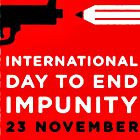23 Nov 2012 | Middle East and North Africa
OPINION
“Maybe we have a discussion about who is a journalist,” said Israeli government spokesman Mark Regev, in a much-publicised interview with Al Jazeera on Monday during which he was grilled about Israeli attacks on media centres in Gaza City. Even with the hopes for the current ceasefire holding, this is undoubtedly still a discussion that needs to be had, as Israel’s behaviour towards journalists throughout the week-long Gaza crisis has set something of a precedent.
The main target, hit during three out of the five incidents, was the Al Shorouq tower, known locally as “the journalists’ building”, as it housed media outlets including Sky News, Al Arabiya, Al Quds TV and Russia Today. The third attack killed two people, including a local head of a branch of the militant group Al Quds brigades, and wounded eight journalists. Regev dismissed suggestions Israeli forces were targeting journalists, saying:
If you can bring me someone who is a bona fide journalist who was injured, I want to know about it.
At the suggestion that Palestinian journalists were not being given the same level of respect that Regev gives the Israeli media — which he praises for its freedom — the spokesman argued that the media in Gaza is not free, implying it is a legitimate target for Israeli attacks.

An Israeli air strike on Gaza City – Demotix
The illegitimacy of Palestinian media has been the first line of defence by Israelis justifying four separate attacks on media centre buildings — and one journalist directly — since the beginning of the Gaza crisis. The first attack last Sunday morning used five missiles to target a tower block housing pro-Hamas station Al Aqsa TV as well the offices of independent Palestinian news agency Ma’an, and has previously housed international media such as the BBC. According to Reporters Without Borders, “around 15 reporters and photographers wearing vests with the words TV Press were on the building’s roof at the time, covering the Israeli air strikes”. In an attack on Tuesday, two journalists from Al Aqsa TV were killed by an Israeli airstrike while driving in a car marked “press”.
Regev told the Al-Jazeera presenter: “unlike the country where you’re broadcasting from, Israel has a free press, the Israeli press is very aggressive and we respect that right.” He later added: “If you think Al Aqsa is free press, like say Tass in the former Soviet Union is a free press [sic], then let’s be serious for a second.”
Regev ignored how Israeli media is, like Al Aqsa, also likely to publish articles in favour of its own government’s policy, particularly in a time of heightened conflict. Witness the infamous Jerusalem Post article published by Gilad Sharon (son of Ariel), entitled “A decisive conclusion is necessary”, which stated: “There is no middle path here — either the Gazans and their infrastructure are made to pay the price, or we reoccupy the entire Gaza Strip.”
Al Aqsa in particular may not be a sterling example of free media, but that an attacking army is allowed to cherry pick sources of “legitimate” media is highly disturbing. It also implies that the IDF are of the belief that for Palestinians, their nationality trumps all, making them supposedly legitimate targets. Regev himself used the word “legitimate” to describe channels such as Al-Jazeera and the BBC in comparison to Al Aqsa, although offices used by Al Jazeera were also damaged during a nearby attack on the Abu Khadra building on Wednesday night, and offices of Agence France-Press (AFP) were targeted on Tuesday evening. Journalists, regardless of whether their outlet is considered “legitimate”, have been treated as collateral damage in this conflict.
Regev also blamed Hamas for “using journalists as human shields” by “placing their communications equipment in buildings that they know that journalists will use”. For their part, Ma’an stated when reporting on this issue that “there is no military infrastructure of any kind inside the building,” referring to the Al Shawa tower, another media base. The IDF have provided no proof of the communications equipment on either building.
Israel made much of its decision to allow international media into Gaza, from keeping the northern Erez checkpoint open to fast-processing of the press cards that allow journalists to cross it. On arrival at Erez, it was mandatory for all journalists to sign a waiver, stating that should they come to any harm, the IDF bears no responsibility.
The Israeli Government Press Office was also quick to condemn rumours of Hamas refusing to allow journalists to leave Gaza, but had fewer qualms about making its own demands that restrict journalists’ movement when inside the Strip. It explicitly warned journalists to stay away from anything or anyone connected to Gaza’s ruling Hamas party — a difficult task in a place as densely-populated as Gaza. In one incident, Nicole Johnston from Al Jazeera’s English service reported receiving a message from the IDF which said:
Don’t take any Hamas or Islamic Jihad leaders in a car with you. We know who we’re looking for. We know their cars.
This implies that journalists were expected to consider contact with any Hamas official as overtly making themselves a target, a tactic designed to dissuade them from conducting interviews or engaging in any activity where the perspective of Hamas might be broadcast.
International media have praised the Israelis for their decision to allow Gaza to remain open, in contrast to Operation Cast Lead in 2009. But there is evidence of sleight-of-hand with journalistic safety, and the so-called “rules of engagement”. Targeting media, or in this case — targeting journalists who either don’t or can’t comply with the IDF’s demands — ignores Protocol 1, Article 79 of the Geneva Convention which states it is a war crime to target the media. This is despite a press release distributed by the Israeli government press office, which stated: “Israel and the IDF are fully committed to international law in general, and to the Laws of Armed Conflict in particular”.
International media have been flooding into Gaza to work alongside Palestinian media. But with such an aggressive targeted air campaign in one of the most densely populated areas on Earth and no “front line” to speak of, the most that both parties were able to do was to speak up in order to hope that Israel would react to international pressure to accept some part of the so-called “rules of engagement” and avoid targeting journalists.
The ceasefire is holding for now, but there are many lessons to be learned from the past week and a half, most of all because the vast majority of people believe that similar attacks on Gaza are likely to happen again. If that is the case, it is not unreasonable to expect that Israel and the IDF will have learnt that the harming of media of any nationality is not just an action which attracts the bad press that they seek to avoid. It is a crime.
Ruth Michaelson is a freelance journalist currently on assignment in Gaza. She tweets at @_Ms_R
20 Nov 2012 | News
LONDON (INDEX). Exposing financial crime is a dangerous career path. David Marchant — an investigative journalist and publisher of OffshoreAlert — knows that. He has been sued numerous times and has never lost, his first accuser is currently serving 17 years in prison for tax evasion and money laundering.
Offshore alerts specialises in reporting about offshore financial centres (known as OFCs), with an emphasis on fraud investigations, and also holds an annual conference on OFCs focusing on financial products and services, tax, money laundering, fraud, asset recovery and investigations. It caters to financial services providers and other financial institutions.
Marchant talks to INDEX — ahead of the OffshoreAlert Conference Europe: Investigations & Intelligence, 26 – 27 November — about the importance of free expression and the peculiarities of his trade.
 INDEX: As investors continue to pour millions of pounds each month into offshore bank accounts, the Western world is in economic disarray, demanding much more from law-abiding taxpayers to bailout banks. What is your view on the economic crisis, and has it had any effect on the type of investigative journalism you practice?
INDEX: As investors continue to pour millions of pounds each month into offshore bank accounts, the Western world is in economic disarray, demanding much more from law-abiding taxpayers to bailout banks. What is your view on the economic crisis, and has it had any effect on the type of investigative journalism you practice?
DAVID MARCHANT: It is unfair to blame the global economic crisis on offshore financial centres. It is, essentially, a people-problem, the majority of whom live in the world’s major countries.
For me, the most interesting aspect of the crisis is that it confirmed what I already knew, i.e. many of the world’s major banks and financial services firms are not well managed. A significant part of the problem is that offering huge short-term financial incentives invites your personnel to act in a manner that is not in the long-term interests of a company. It encourages risk-taking and the concealment of losses to create the appearance of success, as opposed to actual success. It seems that few, if any, material changes have been made to the system, that you can’t change human nature overnight and that history is destined to repeat itself in the future. Other than the crisis causing more schemes to collapse early and there being more to write about, it has had no effect on OffshoreAlert’s investigative reporting.
INDEX: Greek investigative journalist Kostas Vaxevanis was arrested a few days ago in Athens for publishing the “Lagarde List” —containing the names of more than 2,000 people who hold accounts with HSBC in Switzerland (one imagines, hoping to escape the taxman). The list remained unused for two years after Christine Lagarde passed it onto then Finance Minister Giorgos Papakonstantinou. What do you think about it?
DM: It would not surprise me if the Greek authorities had indeed sat on this information. Governments and corruption or incompetence go hand in hand.
INDEX: Tax evasion is not considered money laundering in some jurisdictions, and it looks less frightening than laundering drug or criminal proceeds. Do you hold any views on this subject?
DM: Money laundering is a criminal offence in its own right. The predicate crimes vary country by country and, in some countries, tax evasion is not among them or was not among them now at one time. In the Cayman Islands, for example, fiscal offences were initially omitted from the jurisdiction’s money laundering laws but the jurisdiction was forced — screaming and kicking — into adding them at a later date. Tax evasion clearly should be a predicate crime. Paying taxes is a price we must pay to live in a civilised society. Who wants to live in an uncivilised society? Certainly not me.
INDEX: How do you balance the need for privacy with the need for transparency in the offshore world?
DM: As a journalist, the more transparency the better but information must be handled responsibly. The word “privacy” is a soft word for secrecy and people have secrets for a reason, i.e. they are typically trying to conceal something that is illegal, immoral or otherwise shameful.
INDEX: You receive sponsorship from security companies like Kroll Advisory Solutions. The global intelligence industry caters for crooks and corrupt, repressive governments alongside corporate clients. Twenty years ago, the value of this sector was negligible — today it is estimated to be worth around $3bn. Any thoughts on this?
DM: To be clear, OffshoreAlert is an independent organisation, not beholden to anyone or anything other than accuracy and fairness. We have limited advertising on our web-site but we do have sponsors for our financial due diligence conferences, which is a commercial necessity. The global intelligence industry is like any other. Companies aren’t particularly choosy about who they will accept as clients. It’s all about making money. I have no idea whether the global intelligence industry has become more prevalent or not over the last 20 years. If it has grown significantly, however, I would guess that much of such growth would be fuelled by banks and other financial firms having to comply with tougher anti-money laundering laws.
INDEX: How do you compare your work with that of, for example, Wikileaks?
DM: I have little or no respect for WikiLeaks. In my limited dealings with the organisation, I have found Wikileaks to be amateurish and fundamentally dishonest. In its very early days, it was clear to me that, in one action at federal court in the United States, Wikileaks clearly misled the court. It is not trustworthy. I consider Julian Assange to be an irresponsible, hypocritical, over-hyped poseur. His major talent seems to be self-publicity. I cringe when I see him described as a journalist. It denigrates the entire profession. Fortunately, there are few, if any, similarities between Wikileaks and OffshoreAlert. We’re not in the same business or market and there is a gulf of difference in the level of professionalism between the two.
INDEX: You actually own 100 per cent of OffshoreAlert and I understand that you are not insured against libel and other legal risks in order to avoid “lawyering” your exposes. Is this correct? Is it necessary in order to safeguard your journalistic independence?

Former accountant and self-styled “offshore asset protection guru”,Marc Harris was convicted of money laundering and tax evasion by the US in 2004
DM: I do indeed beneficially own OffshoreAlert in its entirety. Prior to launch in 1997, I looked into purchasing libel insurance. The premiums were reasonable but the problem was that every article would need to be pre-approved by a recognised libel attorney. That would have been costly and would have inevitably led to the attorney recommending that stories be watered down, which would have defeated the primary purpose of OffshoreAlert, which is to expose serious financial crime while it is in progress. I have an even better de facto insurance policy: If someone sues me for libel, I will take all of my incriminating evidence to law enforcement, and do everything in my power to ensure that the plaintiff is held criminally accountable for their actions. This is no idle promise. The first person to sue me for libel (self-proclaimed “King of the Offshore World” Marc Harris) thought he could put me out of business. Instead, he is currently serving 17 years in prison for fraud and money laundering.
INDEX: However, you have been taken to court for libel on many occasions and always won. So the objective behind these law suits seems to be to intimidate or drain you dry. How do you about surviving suing threats?
DM: OffshoreAlert has been sued for libel multiple times in different countries and jurisdictions. [He was sued in the USA (state and federal court), Cayman Islands, Canada (Toronto), Grenada (by then Prime Minister Keith Mitchell), and Panama]. We’ve never lost a libel action, never published a correction or apology to any plaintiffs and never paid — or been required to pay — them one cent in costs or damages. It is a record of which I am very proud. I know how the game is played, I am extremely resourceful, and I am not intimidated easily. This might come across as conceited, but my attitude towards plaintiffs is that I am brighter, tougher and more talented than you and your attorneys and that, if you want to sue me, I will do everything in my power to ensure that you pay the ultimate price of being criminally prosecuted for your actions.
INDEX: According to organisations such as ours, English libel law has been shown to have a chilling effect on free speech around the world. Especially worrying is “libel tourism”, where foreign claimants have brought libel actions to the English courts against defendants who are neither British nor resident in this country. What do you think about it?
DM: British libel law, generally, is among the most repulsive pieces of legislation that exists in the civilised world. It is a reprobate’s best friend and protects the reputations of people who don’t deserve to have their reputations protected. I couldn’t operate OffshoreAlert in the UK or in any country or jurisdiction that has adopted similar laws because OffshoreAlert would be sued out of existence. British libel law is considered to be so repugnant that, in 2010, the United States passed The SPEECH Act that renders British libel judgments unenforceable in the US there is no de facto free speech in Britain because of its libel laws. I find the entire British legal system to be terrible in dispensing justice. In that regard, it is light years behind the legal system that exists in the US, where OffshoreAlert is based.
Miren Gutierrez is Editorial Director of Index
22 Oct 2012 | Azerbaijan Statements, Campaigns
 Index on Censorship joined more than 40 global media organisations demanding governments, the United Nations and industry take action against violence towards journalists.
Index on Censorship joined more than 40 global media organisations demanding governments, the United Nations and industry take action against violence towards journalists.
The joint statement was delivered yesterday to the UN Educational, Scientific, and Cultural Organization (UNESCO) and marks the second International Day to End Impunity on November 23. The issue will be discussed at the 2nd UN Inter Agency meeting on Safety of Journalists and the Issue of Impunity, to take place 22-23 November in Vienna. (more…)


 INDEX: As investors continue to pour millions of pounds each month into offshore bank accounts, the Western world is in economic disarray, demanding much more from law-abiding taxpayers to bailout banks. What is your view on the economic crisis, and has it had any effect on the type of investigative journalism you practice?
INDEX: As investors continue to pour millions of pounds each month into offshore bank accounts, the Western world is in economic disarray, demanding much more from law-abiding taxpayers to bailout banks. What is your view on the economic crisis, and has it had any effect on the type of investigative journalism you practice?
 Will a new Director General be enough to save the BBC asks Index’s Kirsty Hughes
Will a new Director General be enough to save the BBC asks Index’s Kirsty Hughes Index on Censorship joined more than 40 global media organisations demanding governments, the United Nations and industry take action against violence towards journalists.
Index on Censorship joined more than 40 global media organisations demanding governments, the United Nations and industry take action against violence towards journalists.